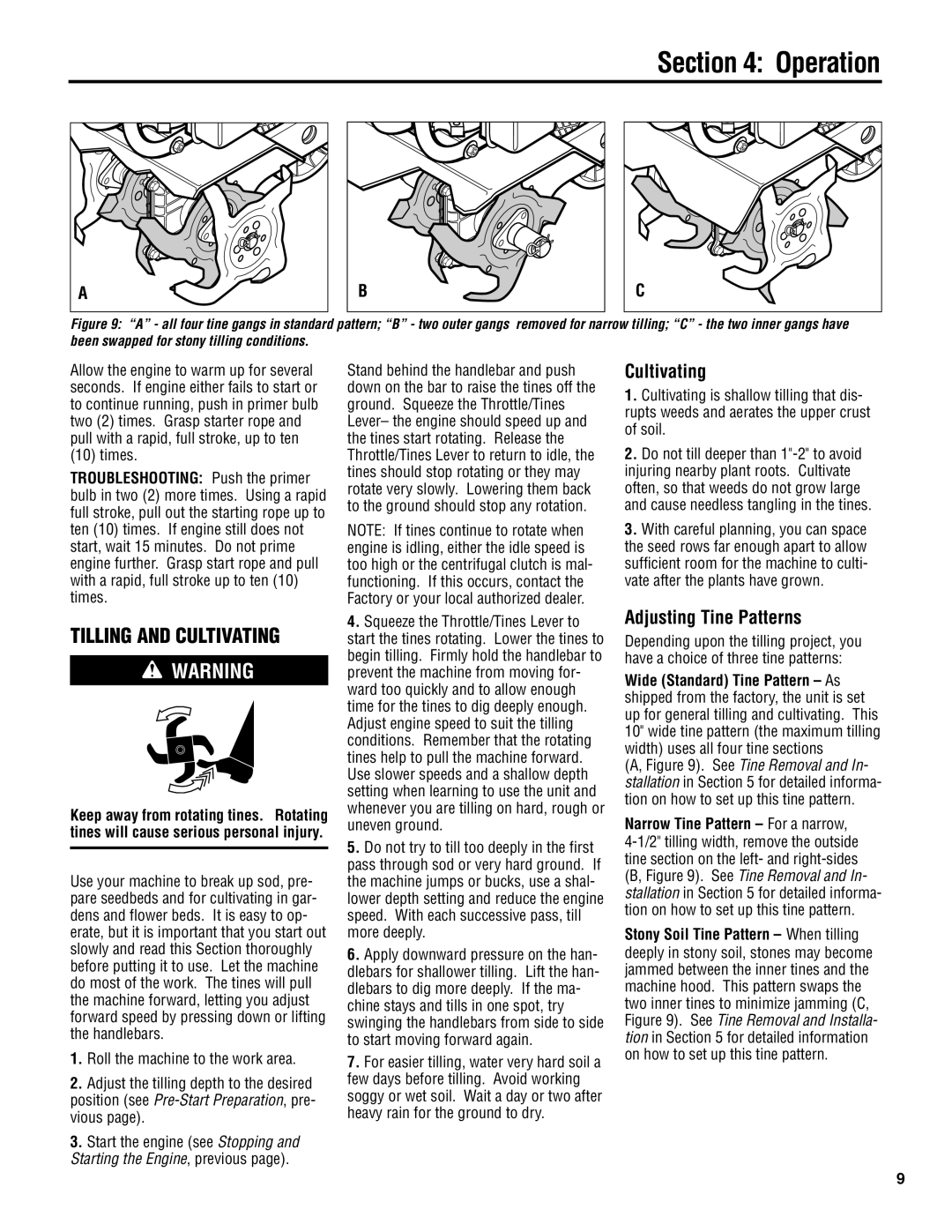
Section 4: Operation
A |
B |
C |
Figure 9: “A” - all four tine gangs in standard pattern; “B” - two outer gangs removed for narrow tilling; “C” - the two inner gangs have been swapped for stony tilling conditions.
Allow the engine to warm up for several seconds. If engine either fails to start or to continue running, push in primer bulb two (2) times. Grasp starter rope and pull with a rapid, full stroke, up to ten (10) times.
TROUBLESHOOTING: Push the primer bulb in two (2) more times. Using a rapid full stroke, pull out the starting rope up to ten (10) times. If engine still does not start, wait 15 minutes. Do not prime engine further. Grasp start rope and pull with a rapid, full stroke up to ten (10) times.
TILLING AND CULTIVATING
WARNING
Keep away from rotating tines. Rotating tines will cause serious personal injury.
Use your machine to break up sod, pre- pare seedbeds and for cultivating in gar- dens and flower beds. It is easy to op- erate, but it is important that you start out slowly and read this Section thoroughly before putting it to use. Let the machine do most of the work. The tines will pull the machine forward, letting you adjust forward speed by pressing down or lifting the handlebars.
1.Roll the machine to the work area.
2.Adjust the tilling depth to the desired position (see
3.Start the engine (see Stopping and Starting the Engine, previous page).
Stand behind the handlebar and push down on the bar to raise the tines off the ground. Squeeze the Throttle/Tines Lever– the engine should speed up and the tines start rotating. Release the Throttle/Tines Lever to return to idle, the tines should stop rotating or they may rotate very slowly. Lowering them back to the ground should stop any rotation.
NOTE: If tines continue to rotate when engine is idling, either the idle speed is too high or the centrifugal clutch is mal- functioning. If this occurs, contact the Factory or your local authorized dealer.
4.Squeeze the Throttle/Tines Lever to start the tines rotating. Lower the tines to begin tilling. Firmly hold the handlebar to prevent the machine from moving for- ward too quickly and to allow enough time for the tines to dig deeply enough. Adjust engine speed to suit the tilling conditions. Remember that the rotating tines help to pull the machine forward. Use slower speeds and a shallow depth setting when learning to use the unit and whenever you are tilling on hard, rough or uneven ground.
5.Do not try to till too deeply in the first pass through sod or very hard ground. If the machine jumps or bucks, use a shal- lower depth setting and reduce the engine speed. With each successive pass, till more deeply.
6.Apply downward pressure on the han- dlebars for shallower tilling. Lift the han- dlebars to dig more deeply. If the ma- chine stays and tills in one spot, try swinging the handlebars from side to side to start moving forward again.
7.For easier tilling, water very hard soil a few days before tilling. Avoid working soggy or wet soil. Wait a day or two after heavy rain for the ground to dry.
Cultivating
1.Cultivating is shallow tilling that dis- rupts weeds and aerates the upper crust of soil.
2.Do not till deeper than
3.With careful planning, you can space the seed rows far enough apart to allow sufficient room for the machine to culti- vate after the plants have grown.
Adjusting Tine Patterns
Depending upon the tilling project, you have a choice of three tine patterns:
Wide (Standard) Tine Pattern – As shipped from the factory, the unit is set up for general tilling and cultivating. This 10" wide tine pattern (the maximum tilling width) uses all four tine sections
(A, Figure 9). See Tine Removal and In- stallation in Section 5 for detailed informa- tion on how to set up this tine pattern.
Narrow Tine Pattern – For a narrow,
Stony Soil Tine Pattern – When tilling deeply in stony soil, stones may become jammed between the inner tines and the machine hood. This pattern swaps the two inner tines to minimize jamming (C, Figure 9). See Tine Removal and Installa- tion in Section 5 for detailed information on how to set up this tine pattern.
9
